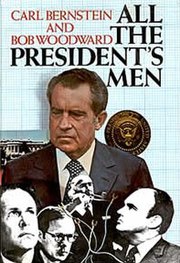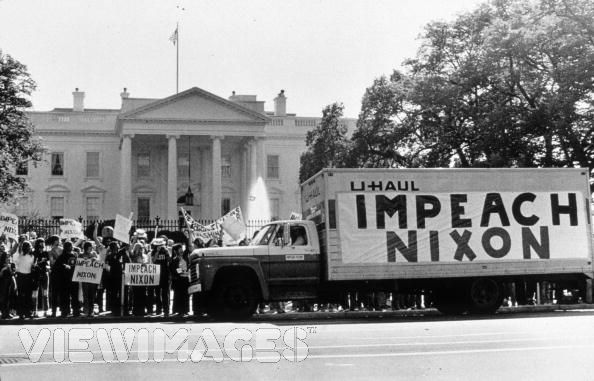 The information that the media recieved on the whole
Watergate scandal can be accredited to one anonymous source: Deep Throat. This
source revealed information that allowed Bob Woodward and Carl Bernstein, journalists
for The Washington Post, to reveal the Watergate scandal to the
general public. The information Deep Throat had for the The Washington Post was very similiar to what the FBI was revealing
to the White House at the time. Deep Throat was first brought to attention by Woodward
and Bernstein in their book All the
President’s Men. The identity of Deep Throat was a conundrum to the people
seeing as Woodward and Bernstein chose to keep the source incognito. On May 31,
2005, Vanity Fair claimed to know the
identity of Deep Throat: William Mark
Felt. Felt, the former Associate Director of the FBI. As the story grew in
popularity Woodward, Bernstein, and Benjamin Bradlee, the Post’s executive editor confirmed this.
The information that the media recieved on the whole
Watergate scandal can be accredited to one anonymous source: Deep Throat. This
source revealed information that allowed Bob Woodward and Carl Bernstein, journalists
for The Washington Post, to reveal the Watergate scandal to the
general public. The information Deep Throat had for the The Washington Post was very similiar to what the FBI was revealing
to the White House at the time. Deep Throat was first brought to attention by Woodward
and Bernstein in their book All the
President’s Men. The identity of Deep Throat was a conundrum to the people
seeing as Woodward and Bernstein chose to keep the source incognito. On May 31,
2005, Vanity Fair claimed to know the
identity of Deep Throat: William Mark
Felt. Felt, the former Associate Director of the FBI. As the story grew in
popularity Woodward, Bernstein, and Benjamin Bradlee, the Post’s executive editor confirmed this.
Felt’s Information
and the FBI
 He served in the FBI for 31 years and was greatly integrated
with the FBI’s knowledge on Watergate. Because of this, Nixon had suspected
him. Although Felt was “confronted” on the issue (not by Nixon himself), he
found ways to divert attention from himself by ordering a federal investigation
on his own leaks. You can’t deny the bravery he displayed in keeping enough
composure in the situation to smartly get out of trouble. Felt was the first
one to suggest Nixon’s use of wiretaps to gather information on his opponents,
confirmed E. Howard Hunt as a “prime suspect” in the case, and told how Gray
destroyed incriminating documents towards Nixon.
He served in the FBI for 31 years and was greatly integrated
with the FBI’s knowledge on Watergate. Because of this, Nixon had suspected
him. Although Felt was “confronted” on the issue (not by Nixon himself), he
found ways to divert attention from himself by ordering a federal investigation
on his own leaks. You can’t deny the bravery he displayed in keeping enough
composure in the situation to smartly get out of trouble. Felt was the first
one to suggest Nixon’s use of wiretaps to gather information on his opponents,
confirmed E. Howard Hunt as a “prime suspect” in the case, and told how Gray
destroyed incriminating documents towards Nixon.
Felt ‘s Questionable Methods
Many paint Felt as a hero for disclosing information that
evidently led to the impeachment of Nixon and the arrest of many who were
involved, but there was a side to him that tampers with his reputation. He was
an avid supporter of J. Egdar Hoover, the first director of the FBI who used
very contriversal and arguably illegal methods to gather information on
political leaders. After Hoover’s death, Felt wanted his position, but Nixon
gave the job to L. Patrick Gray III. The want to take control of the FBI may
have contributed to Felt’s leaking information. Felt subscribed to Hoover’s
ends-justified-the-means way of thinking. Its open debate to whether Felt is a “hero” or
not because while his actions took down a government conspiracy, he was easily
ok with to manipulate whatever he needed to in order to get “justice”, even the
FBI.
Felt ‘s Questionable Methods





